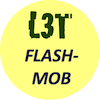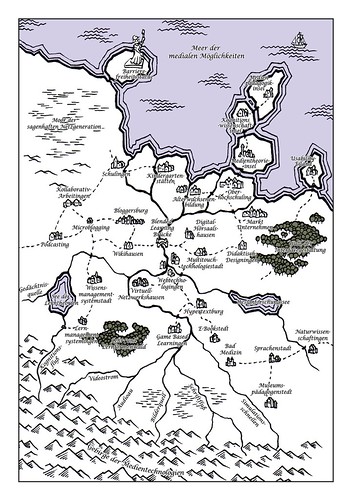So nach dem Online-Flashmob freuen wir uns auf noch eine Ankündigung unser Lehrbuch für Lehren und Lernen mit Technologien betreffend: Wey Tan hat sich bereit erklärt auch einen Beitrag zu liefern und uns diese Landkarte der einzelnen Kapitel gemalt – ich hoffe alle Autor/innen finden sich wieder in den Städten, Flüssen, Inseln oder in den hohen Bergen. Wie auch immer, schöner kann man wohl das interdisziplinäre Feld des technologiegestützten Lernens nicht darstellen. Danke Wey Tan 🙂 .
[l3t] Online-Flashmob
 Das Lehrbuch Lehren und Lernen mit Technologien wird am 1.2.2011 auf der Learntec online freigeschalten. Nachdem nicht alle Interessierten daran teilnehmen können, wiewohl es uns sehr freuen würde, organisieren wir einen Online-Flashmob ab 14.45 Uhr. Einfach mitmachen, wir freuen uns darauf :-).
Das Lehrbuch Lehren und Lernen mit Technologien wird am 1.2.2011 auf der Learntec online freigeschalten. Nachdem nicht alle Interessierten daran teilnehmen können, wiewohl es uns sehr freuen würde, organisieren wir einen Online-Flashmob ab 14.45 Uhr. Einfach mitmachen, wir freuen uns darauf :-).
Für alle jene die an unserer Online-Veröffentlichung des Buches auf der Learntec am 1.2.2011 (15.40-16.20 Uhr) nicht teilnehmen können, was natürlich jammerschade ist, wird ein Online-Flashmob ab 14.45 Uhr stattfinden. Wir hoffen, den Schmerz damit etwas zu lindern, denn ja, es wird auch etwas zu gewinnen geben :-).
[l3t] Technologien aus Sicht von Kindern
Das letzte Video vor dem Online-Start des Lehrbuchs „Lehren und Lernen mit Technologien“ am 1.2.2011 widmet sich durchaus diskussionswürdigen Fragen: „Wie erleben Kinder von heute Technologien? Was sind ihre Technologien?“
Hierzu haben wir ihnen einfach ein paar Technologien (vom Rechenschieber bis hin zum iPad) vorgelegt, mit der Bitte diese zu bedienen oder zu beschreiben. Hier das Ergebnis:
[book] Mobile Gemeinschaften
An dieser Stelle einen Hinweis auf die kürzlich erschienene Studie „Mobile Gemeinschaften. Erfolgreiche Beispiele aus den Bereichen Spielen, Lernen und Gesundheit“ von Sandra. Lesens- und empfehlenswert, nicht nur aufgrund meines Kurzstatements 🙂 .
8 Ways Technology Is Improving Education
Heute einmal etwas aus meiner Linksammlung – „8 Ways Technology Is Improving Education“ (via Mashable.com)
[podcast] E-Learning an Hochschulen
Mein Vortrag an der Montanuniversität über „E-Learning an Hochschulen – Konzept und Strategie am Beispiel der TU Graz“ ist nun online verfügbar. Die Vortragsfolien findet man bereits hier.
[l3t] Interview zu Microlearning
[video] Alte Technologien?
Man nehme 20-Jahr-alte-Technologien und zeige diese Kindern von heute – spannend sind die Reaktionen 🙂 :
[presentation] E-Learning an Hochschulen
Die Präsentation „E-Learning an Hochschulen – Konzept und Strategie am Beispiel der TU Graz“ zur heutigen Veranstaltung „Neue Medien“ an der Montanuniversität Leoben ist nun online verfügbar:
[publication] Open Education Resources als Lifelong-Learning-Strategie
Unser Beitrag für das Buch „The Lifelong Learning University“ über „Open Educational Resources als Lifelong-Learning-Strategie am Beispiel der TU Graz“ ist nun erschienen.
Abstract:
Der Zugang zu offenen Bildungsressourcen – Open Educational Resources (OER) – wird in der heutigen Zeit viel diskutiert, angestrebt und auch eingefordert. Dieser Beitrag widmet sich dem Thema aus Sicht einer Universität und unter dem Gesichtspunkt der für sie geltenden spezifischen Rahmenbedingungen. Auf Basis eines Modells wird gezeigt, welche Maßnahmen an der Technischen Universität Graz getroffen werden und welche Ziele dahinter stehen. Eine kurze Darstellung bereits durchgeführter Aktivitäten rundet den Beitrag ab.
Reference: Ebner, M., Stöckler-Penz, C. (2011) Open Educational Resources als Lifelong-Learning-Strategie am Beispiel der TU Graz, Tomaschek, N., Gornik, E. (Hrsg.), The Lifelong Learning University, Waxmann, Oldenburg, S. 53-60


